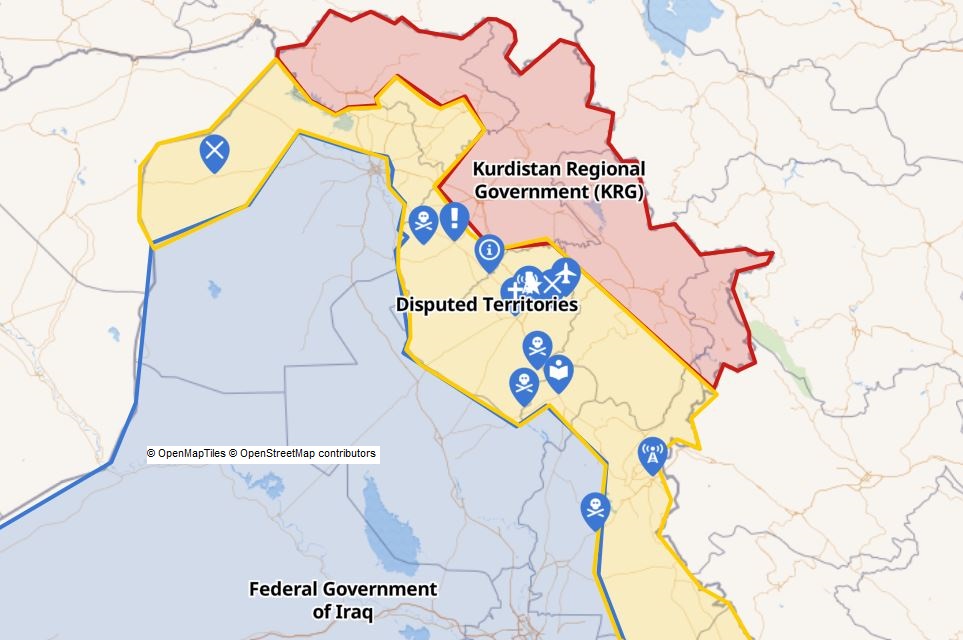1.4K
Kirkuk
- ISIS (Da’esh) terrorists resumed bloody attacks in the region, including an attack on the Shia-majority village of Rashad near Sharaban (Miqdadia) city in Diyala on Tuesday, killing eleven civilians. After the attack, the villagers took arms and retaliated by killing a dozen individuals from a neighboring Sunni village, accusing them of harboring Da’esh terrorists. Tensions were high and fear of sectarian war led dozens of families to be displaced. On Wednesday night, the terror group attacked the 2nd brigade of the 45th division near Haftagar village in Kirkuk, killing a soldier during the hour-long clash. The same night Iraq’s Joint Operation Command declared the highest alert level as a preventive measure for further and anticipated attacks.
- After months of an agreement to deploy joint forces of the Iraqi army and the Peshmerga, Prime Minister Mustafa al Kadhimi transferred Peshmerga’s 20th division personnel to Iraq’s Defense Minister in preparation for their deployment across the disputed territories. The region continues struggling from the security vacuum left by the Peshmerga forces when they were removed by Baghdad and Iranian-backed militias on October 16, 2017.
- Iraqi National Security’s (INS) Kirkuk branch announced the arrest of “the most dangerous electronic blackmailer” named Massud Akram Zangana, who is also the elder son of a controversial figure in Kirkuk. According to the INS, Zangana resisted his arrest during the raid and attempted to flee, but he was captured and wounded. Two INS members were injured in the pursuit. Zangana is accused of managing 30 social media pages, blackmailing Iraqi Government officials, including security personnel, and taking ransoms. Zangana also owns a television station in Iraq.
- Turkey claimed its National Intelligence Organization (MIT) assassinated three Kurdistan Workers’ Party (PKK) members in Kirkuk. On October 4 and 8, Turkey drones bombarded Saidan village of Qara Hanjeer sub district northeast of Kirkuk.
- On Tuesday, October 26th, the Iraqi army arrested several militants of Asa’ib Ahl al-Haq in the Dibis district after they provoked local police and assaulted them inside their station. The militants attempted to resist during the arrest, but they were outnumbered, making them face article 4 of Iraq’s terror law.
- After immense pressure by the Kurdistan Regional Government (KRG) and Kurdish activists, Iraq’s Prime Minister al Kadhimi annulled a plan to reestablish an Iraqi military base on a site used by the former regime to massacre Kurds in Kirkuk Governorate’s Tobzawa. Iraq’s Ba’athist government held 55,000 Kurdish detainees at the Tobzawa camp; these detainees were later killed or buried alive in mass graves in southern Iraq.
- Nearly 50 people protested the Finance Ministry’s freezing of their hiring process for the police despite having completed their hiring application a year and a half ago. The protest was held in front of Kirkuk’s governorate building.
- The Independent High Electoral Commission (IHEC) announced that only one case of complaints had gone through among 50 filed by the electoral candidates in Kirkuk. The IHEC manually recounted several voting stations in Kirkuk, matching its previous results.
- After KRG official complaints about the acting governor’s policies against the Kurds, Rakan Saed reacted by hiring two Turkmen to senior positions in the governorate, a move considered to be a challenge to the Kurds.
- The Ministry of Youth and Sports announced the reopening of Kirkuk’s Olympics stadium after a decade-long renovation process. In 2003, the stadium was home to hundreds of Kurdish families displaced by the former regime. However, later they were given new homes under the former administration headed by Dr. Najmaldin Karim.
Khanaqin
- The Iranian-backed Fateh coalition led by Hadi al Ameri filed 17 complaints to the IHEC over election results. The Fateh coalition is waiting for the IHEC to decide on its objections after suffering significant losses.
- Dozens of college graduates protested unemployment in Khanaqin on Sunday, demanding hiring after years of postgraduate unemployment. Meanwhile, in addition to the shortages of primary service, last week’s fuel shortage and rise of prices created a new issue for the administration. The Khanaqin mayor said the high fuel prices in the Kurdistan Region made many travel to the town, causing shortages.
Tuz Khurmatu
- On Tuesday, October 26th, Da’esh terrorists attacked the Iraqi army near Zarga village, killing a soldier from the 52nd division. On the same day, the security forces announced the arrest of two terrorists in the Tein neighborhood after information from other Da’esh detainees.
- The school of Kurdish studies announced its deep concerns about the decline in new student enrollment, which had dropped from 1300 in the past five years to only 300 this year. The Kurdish school said families are reluctant to send their children to the Kurdish studies school since it has no support from Baghdad compared to Arabic schools.
Makhmour
- According to Makhmour Operation Command, a Da’esh terrorist was killed by the Iraqi army near the Qara Chokh mountain on Sunday. Da’esh has been using the mountain range as a new headquarter since 2019, launching attacks on a weekly basis. Further, Kurdish party officials warned of similar attacks in Makhmour like those that took place in Dilayla if the area isn’t clear from the terror groups.
Shingal (Sinjar)
- Turkey’s ambassador in Baghdad Ali Riza Guney accused the Kurdistan Workers’ Party (PKK) of being the main reason for hindering the implementation of the security agreement between Baghdad and Erbil over the Yazidi town. Guney said that Turkey is operating in support of this security agreement. On several occasions, Turkey has struck the Yazidi town causing civilian casualties, targeting the PKK-offshoot Shingal Resistance Units (YPS).

